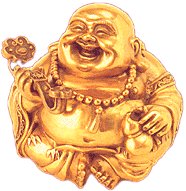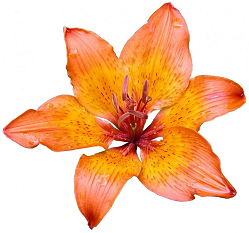|
|



|
Random Image
The Dhammapada
Chapter Twenty Five: The Bhikkhu
Restraint of the eye is good,
Good is restraint of the ear.
Restraint of the nose is good,
Good is restraint of the tongue.
Restraint of the body is good,
Good is restraint of speech.
Restraint of the mind is good,
Good is restraint in all circumstances.
Restrained in all circumstances,
The bhikkhu is released from all suffering.
The one with
Hands restrained,
Feet restrained,
Speech restrained,
Who is foremost among the restrained,
Inwardly delighted,
Composed,
Solitary,
And contented,
Is called a bhikkhu.
Sweet is the speech
Of a bhikkhu who
Restrains his mouth,
Speaks insightfully,
Is not conceited,
And illuminates the teaching and the goal.
The bhikkhu who
Dwells in the Dharma,
Delights in the Dharma,
Reflects on the Dharma,
Recollects the Dharma,
Doesn't fall away from the true Dharma.
One shouldn't scorn what one has received,
Nor envy others.
The mendicant who envies others
Doesn't become concentrated.
The gods praise the mendicant
Who lives purely and untiringly
And who doesn't scorn
What he or she receives,
Even if receiving just a little.
Anyone who doesn't cherish as "mine"
Anything of body-and-mind
And who doesn't grieve for that which doesn't exist,
Is indeed called a bhikkhu.
A bhikkhu dwelling in loving-kindness
And pleased with the Buddha's teachings
Attains happiness, the stilling of formations,
The state of peace.
Bhikkhu, bail out this boat.
Emptied, it will move quickly for you.
Cutting off passion and aversion,
You will go to Nirvana.
Cut off the five lower fetters;
Let go of the five higher fetters;
Above all, cultivate the five faculties.
A bhikkhu who surmounts five attachments
Is called "someone who has crossed the flood."
Bhikkhu, be absorbed in meditation;
Don't be negligent;
Don't let your mind whirl about
In sensual desire.
Don't be negligent and swallow a molten iron ball,
And then, being burnt, cry out,
"This is suffering!"
There is no meditative absorption
For one without insight.
There is no insight
For one without meditative absorption.
With both,
One is close to Nirvana.
For a bhikkhu with a peaceful mind,
Who enters an empty dwelling
And clearly sees the true Dharma,
There is superhuman joy.
Fully knowing
The arising and passing of the khandhas,
One attains joy and delight.
For those who know, this is the Deathless.
The starting point for an insightful bhikkhu is
Guarding the senses,
Contentment,
Restraint according to the monastic rules,
And associating with good spiritual friends
Who live purely and untiringly.
If one is friendly by habit
And skillful in conduct,
One will have much delight
And bring an end to suffering.
As jasmine sheds its withered flowers
So, bhikkhus, shed passion and aversion.
Peaceful in body, peaceful in speech,
The bhikkhu peaceful and well-concentrated
Who has rejected the world's bait
Is called "one at peace."
Admonish yourself.
Control yourself.
O bhikkhu, self-guarded and mindful,
You will live happily.
Oneself, indeed, is one's own protector.
One does, indeed, make one's own destiny.
Therefore, control yourself
As a merchant does a fine horse.
A bhikkhu filled with delight
And pleased with the Buddha's teachings
Attains happiness, the stilling of formations,
The state of peace.
Engaged in the Buddha's teachings,
Even a young bhikkhu
Lights up this world
Like the moon
Set free from a cloud.
...excerpt from The Dhammapada
Continue to Chapter Twenty Six...



Contact • Feedback • Typo • Privacy • Home